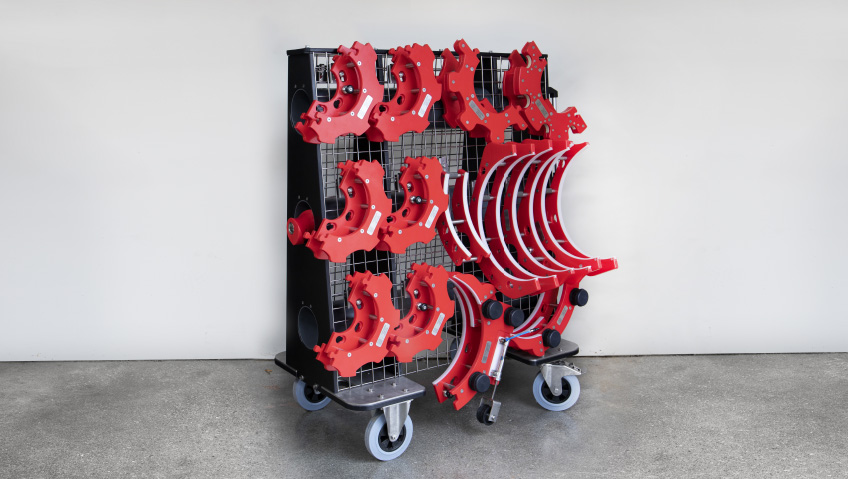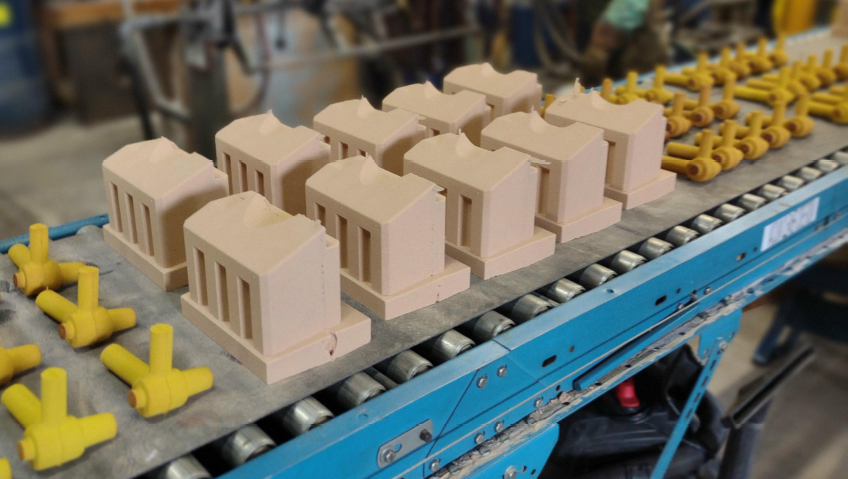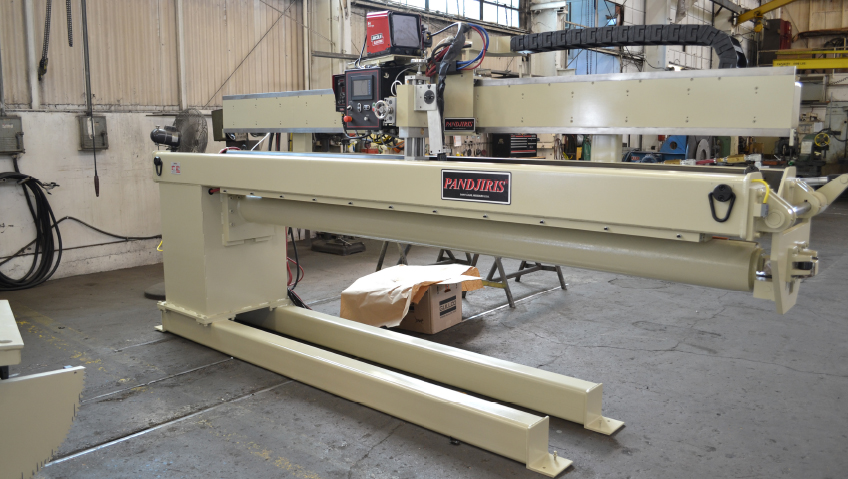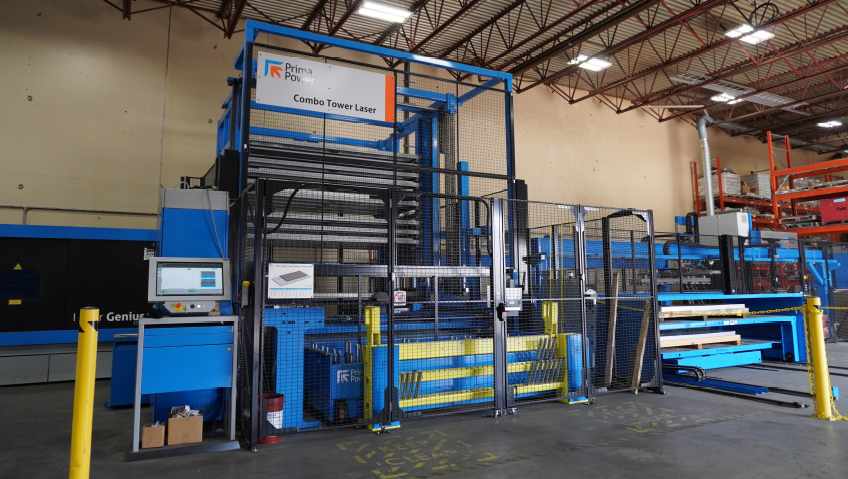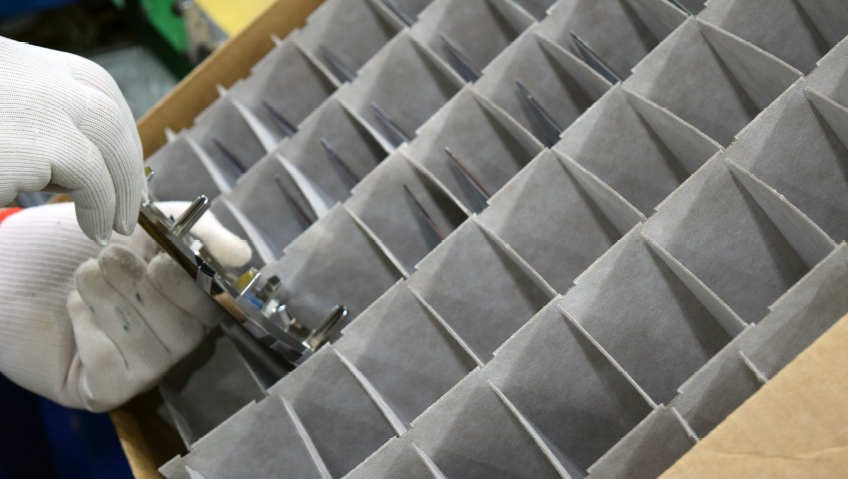Experts in overcoming difficulties involved with optimizing changeovers and container handling on packaging lines, Septimatech Group’s knowledge and expertise gathered from working on more than 2,700 different makes and models of packaging machines and lines lends itself to increasing productivity of clients’ packing lines and machinery while enhancing ergonomics and streamlining processes.
Established in Waterloo, Ontario with seven employees 30 years ago, Septimatech emphasizes teamwork (Sep-TEAM-a-tech), innovation, and providing exceptional customer service and high-quality products, with dedicated and skilled workers actively supporting ongoing packaging line and machine changeover and container handling improvements for clients.
“The big thing over these 30 years as a global supplier of packaging line and machine changer solutions is we’ve always been committed to the customer through partnerships,” says Quinn Martin, OEM and International Sales & Marketing. “We always want to make sure we’re partnering with our customers, not just providing a solution. We have a portfolio of products that we offer and these products can be adapted to the customer’s needs, to solve what their challenges and problems are.”
The company is also committed to listening to clients, learning what their challenges are, and then ensuring they have the proper solution and product being offered to them.
Upholding this premise is basically the way Septimatech has always operated, Martin adds, and the customer’s success with Septimatech’s products and solutions has propelled Septimatech’s success to become the industry leader for packaging line and machinery changeovers, increased container handling performance, and throughput.
“We’ve been successful because we never wanted to become complacent,” says Martin. “Through the partnerships we’ve devised with our customers, we’ve always wanted to be listening and hearing what they need. And by listening and hearing what they need, it’s always allowed us to adapt and move with the consistent innovations in the packaging industry.”
By moving and adapting with these new innovations to provide whatever solution the client needs, the company has been able to devise new products and a continued evolution of its existing products. “We’ve got a handful of customers that we had in year one and two that are still with us, either through the original brand name that they started out with, or they’ve been acquired by somebody else. And we’ve just continued growing with them. We check all the boxes that the customers are really looking for and needing,” Martin says.
“Part of it is the collaboration we have with the customer through the whole process of completing a project,” adds Jonathan Hodge, Marketing Specialist. “For instance, for identifying washdown requirements—one very specific need that a customer might have—we get that out of collaborating with the customer on materials, operating parameters, and environment before and during the design process to really understand what they want to do to improve their parts beyond just changeover efficiencies.”
In the continually evolving packaging industry, it’s vital to not only stay on top of every new innovation but to maintain close relationships with the customers who would most benefit from these innovations—for instance, with the recent adaptation of cardboard containers in place of plastic in an effort to embrace sustainability.
“Packaging itself has a significant impact on sustainability in our workplaces and also our personal lives at home,” says Martin. “It’s about waste reduction and protecting the environment. So that’s where we have to really grow and actually adapt.”
Helping clients overcome challenges that threaten uptime, throughput, product handling, and overall line performance is also a large part of Septimatech’s goal, with its expertise playing a vital role. By drawing upon its greater than 30 years in business, the company aims to apply its knowledge as much as possible to the newest trends in the industry today. “We try to make sure that what we’ve learned across the last 30 years on other projects and other industries can be cross-pollinated to the current industry that we’re working in,” Martin says.
Working in a wide variety of sectors such as beverage, food, chemical, home care, personal care, cosmetics, pharmaceutical, nutraceutical, and more recently, the pet industry requires understanding each industry’s nuances and techniques.
Certainly, the company has seen a lot of changes over the years, such as in grocery stores where low-concentration products are being replaced with high-concentration products, allowing consumers to get the same amount of product use out of a smaller container. Even the ergonomics of the containers themselves have changed, adds Martin, whether it’s a shape, a handle, or the introduction of tamper-proof lids.
“That’s all evolved over the years; the packaging has adapted and each one of our customers still have to run that package being introduced on their existing equipment,” he says. “We continually adapt and work with our customers to understand what their needs are and how we can actually come up with innovative solutions to handle a different geometric shape or size a container or their machine. For example, in the personal care industry the shampoo bottles are not a regular round bottle with a screw top anymore; they have some very unique geometry and shapes. The top of the container is for consumer want and appeal, but there’s also engineering in there that’s been done by a CPG company in the consumer packaged goods field to actually make it more environmentally friendly.”
With companies also looking to ship more product with a smaller footprint, this means Septimatech needs to adapt equipment to non-conventional shapes.
The first industry that came out with the lightweight container was water bottles, Martin adds, which created certain nuisances Septimatech had to learn from in order to help other industries adapt when they came on board.
“It goes back to our partnering and working with them across industry pollination, but also having the key goal in the end that the product solution works right the first time and be able to be installed by any operator on the line, and be ergonomically friendly and be toolless,” says Martin. “The current primary goal is that they want to be running that machine instantly at a full, 100 percent production rate immediately after a changeover and not have to tweak it to get back up to that proper speed.”
While it’s been a trend for a few years now, Septimatech also offers a number of automation solutions to help support its customers when required, whether or not employees are technically proficient.
“In some cases it’s literally a click of a button and the changeover is completed,” says Hodge. “But even our solutions that don’t have that necessarily still do support simplifying changeovers enormously because you can have somebody who is not necessarily proficient with the whole machine be able to very easily swap out a set of change parts, just because of the way they’re designed and engineered.”
While this ability helps set Septimatech apart in the industry, the fact that the company is “small and nimble” is also a distinction, says Martin. When clients need assistance, the company is able to react quickly and efficiently.
“With the way we’ve set up communications internally and externally, there are multiple ways customers can get in touch with us, whether it’s for a new product, they need spare parts, or they need service,” adds Hodge. “It ties back to being in business for as long as we have and the relationships that customers have developed, whether with a salesperson or a service tech or a project manager. A lot of our people are quite familiar with the lines, machinery, and projects that we have with many customers. So it’s the attention to detail that we give our customers that makes the difference.”
As much of an emphasis as Septimatech puts on the customer and solution, the company is also committed to its employees and company culture, working to ensure that employees come to work happy in a place where they have fun and have the chance to grow.
“The employees make the company,” says Martin. “Our strength really is our employees and their talent. We have a culture of finding win-win-win solutions, for the customer and the company.”
In support of this positive workplace culture is Septimatech’s code of conduct—Living the Legacy. This code is based on seven key principles including acting with trust and honesty, open communication, and cooperating and sharing responsibility.
“Everything we do is in some way tied back to meeting one of those seven aspects,” Hodge says. “We really don’t have departments; we have teams, and they really do act and communicate like teams. It’s incredible to see the way they work together and how things get pushed through the process.”
With this emphasis on creating a strong company culture, finding the right employees can be challenging in an industry that’s suffering in the labour force arena. Septimatech has experienced significant growth this last year, so training individuals properly in new areas is vital.
“If we don’t bring them on and train them, who’s going to do that?” says Martin. “So we always make sure we find a candidate with the right capabilities, where the heart is there and they fit the culture. If they have the will and want to learn, we’ll teach them how.”
Proper training is a number one priority for the company, he adds. While always fighting for the same labour pool amongst vendors and competitors, Septimatech continues to rise above with a company culture that strives to make the workplace an ideal draw for those willing to learn and put in the work. And its consistent quality and dedication to treating customers with attention and respect will undoubtedly propel the company well into its next 30 years.
“It’s more than just selling them on the first solution,” says Hodge. “It’s also supporting them after the first project and into the future.”

